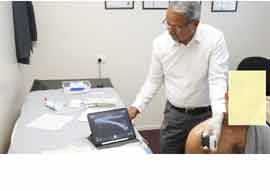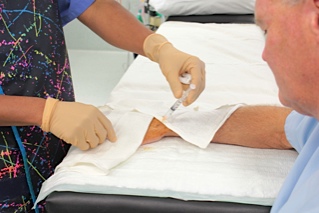Pain Interventions
Pain interventions, such as injections, are an important part of managing chronic musculoskeletal pain. These treatments do not aim to cure the underlying condition but are used as a tool to control and alleviate pain while other treatments are actively working. The goal is to break the pain cycle, providing temporary relief to improve quality of life and allow patients to engage more effectively in rehabilitation.
For patients suffering from chronic pain, particularly those with hyper-sensitisation of the nervous system, repeat injections may be necessary to reduce pain sensitivity and facilitate the recovery process.
Types of Pain Interventions
At MSM Pain Clinic, a variety of injection treatments can be administered, tailored to each patient's specific needs.
Injections offered for pain management of acute and chronic musculoskeletal problems may include:
>Facet joint injections for back pain
>Local anaesthetic around the peripheral nerves and myofascial trigger points
>Peripheral nerve block injections
>Injections under ultrasound guidance:
- caudal epidural steroid injections for leg pain related to lumbar disc herniation
- SI joint injections
- injections for other joints
- subacromial bursitis and/or shoulder joint injections
- De Quervain's tenosynovitis injections
- Tennis elbow, and various small joints of hand and wrist injections
- Greater trochanteric bursitis, knee joint, ankle, subtalar joint, and various small joints of foot injections
- Injections along tendon sheaths
- Hip joint injections
Other types of deep injections require X-ray, ultrasound or CT scan guidance to administer them at the desirable site. We can refer you to a facility which is able to provide these types of injections.
Similarly, if any patient-related conditions prevent a precise injection at MSM Pain Clinic, then these patients can be referred to a suitable facility.
Treatment Process and Patient Support
Before any injection is performed, Dr. Singh will thoroughly explain the procedure, outlining potential benefits, risks, and alternative treatment options. Patients are given the opportunity to ask questions and discuss the treatment with family or a support person. If needed, a follow-up appointment can be arranged to allow time for further discussion or decision-making regarding the injection.
Guidance and Follow-Up
After an injection, a follow-up appointment is arranged for patients, to evaluate the outcome and advice given with regard to exercises, physiotherapy, and lifestyle changes to improve long-term outcomes.




